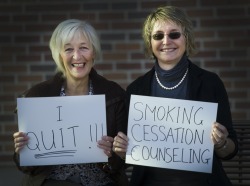Pharmacists help patients kick "the butt"

Every 11 minutes a Canadian dies as a result of tobacco use (Health Canada). The dangers of smoking are no secret – cardiovascular and lung disease, cancer, spontaneous abortions, Sudden Infant Death Syndrome (SIDS), premature aging and more. Despite declining national rates, one in six Canadians still smoke.
“A cigarette is the only drug I know of that is guaranteed to kill at least half the people who use it,” said Dr. Leslie Phillips (School of Pharmacy), who recently pledged to start counseling her patients on smoking cessation. The pledge follows the Canadian Society of Hospital Pharmacists (CSHP) 2015 Initiative – a campaign that focuses on “A Vision for Pharmacy Practice Excellence by 2015.
She researched smoking cessation literature and completed online continuing education programs, including the Canadian Pharmacists Association’s QUIT: Quit Using and Inhaling Tobacco.
She created a plan for how to ask patients about smoking, how to assess their willingness to quit and motivate them to quit, and how to assist in the cessation process. She planned the information she would cover in each visit, and which supplementary materials she would require.
“I work in a mental health practice and perhaps the most significant non-psychiatric health issue facing my clients is smoking, so it’s logical for me to want to expand my knowledge in this area,” she said. “When smokers quit, the health benefits to our population are immeasurable. Pharmacists are uniquely positioned to make this happen.”
Her colleague, Karen Brown, was a smoker for over 40 years and agreed to act as “a guinea pig, of sorts”. The pair began working together in February 2014. She has been a non-smoker ever since.
Ms. Brown confessed that she experienced some sleepless nights in the early weeks. It was difficult to resist the triggers (coffee, being with friends who smoked). But she soon adopted the one-day-at-a-time mentality.
“As a day turned into a week, then a month, I started feeling proud to think of myself as a non-smoker. I remember seeing my doctor for the first time since quitting and blurting out, ‘I’m a non-smoker!’ - I felt a huge sense of accomplishment.”
Dr. Phillips plans to encourage her fellow pharmacists to be more proactive in smoking cessation, and train her pharmacy students to perform counseling. She hopes to offer a student-operated traveling “Quit Clinic” next summer.
“We could go around to family practice settings to offer the service,” she said. “As of this October, the Newfoundland and Labrador Prescription Drug Program will be subsidizing the cost of some prescription smoking cessation products, and this year’s Pharmacists Association of Newfoundland and Labrador Annual Conference put out a request for pharmacists to speak about smoking cessation. It also fits in well with the movement towards an expanded scope of practice. It’s an opportune time to offer this service.”
While some resources for smoking cessation do exist in Newfoundland and Labrador, Dr. Carlo Marra (Dean), believes that there are opportunities for pharmacies to offer more personal and hands-on quit strategies.
“Even though the majority of smokers want to quit, many are not routinely approached by a health care professional, and only about 20% of people who have tried quitting have used a smoking cessation aid – despite that smoking cessation medications double, in some cases triple the chances of abstinence. Since pharmacists are the most accessible health care professionals – and pharmacies across Canada do offer these services - the benefits of offering such a service in this province are vast.”
As far as Ms. Brown is concerned, the benefits have been life-changing.
“I so enjoy that I can breathe without having a rattle, my coffee tastes wonderful, and life is easier now – I’m not always looking at my watch wondering when I can go for my next cigarette, I no longer look around the room hoping to find another smoker. Right now I cannot imagine smoking again.”